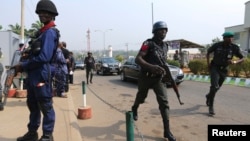ABUJA —
After Nigerian President Goodluck Jonathan fired his top military chiefs this week, some analysts said it signified a failure of the old guard to beat Islamist militants in the north. Some say a fresh approach to the security crisis is one of several changes the president appears to be making ahead of elections next year.
Three states in northern Nigeria have been virtually occupied by military forces for eight months now, but insurgent attacks continue.
When President Goodluck Jonathan announced new leaders for the defense department, the army, the navy and the air force on Thursday, he did not give a reason. But political consultant Fabian Ihekweme said it appears the president is trying a different approach to the security crisis.
“You may recall a few days ago that a new anti-terrorist outfit has been created out of the Nigerian military. So it is the same new strategy being developed by the president to tackle the Boko Haram menace,” said Ihekweme.
Human Rights Watch said 40 people were killed and 50 were injured Tuesday when a car bomb exploded outside a post office in Maiduguri, the original home of the Islamist militant group known as Boko Haram.
Last month, in an overnight attack in Maiduguri, militants damaged an army base, a police station, a gas station and dozens of vehicles. An air force base was also attacked.
Boko Haram has killed thousands in more than four years of insurgency and the continued violence has harmed the president’s popularity, an issue that is increasingly pressing as elections approach in 2015.
Many high-level officials, including five state governors, have recently defected from the ruling People's Democratic Party. Party chairman Bamanga Tukur resigned Thursday, a move ruling party members said they hope will prompt defectors to return.
But Clement Nwankwo, the director of the Policy and Legal Advocacy Centre in Abuja, said Tukur’s exit will not bring them back. “The issue is not even Tukur. Tukur is not important. It’s just an excuse for a lot of people to keep the fight with Jonathan going,” he stated.
Ruling party defections are not entirely about security issues, Nwankwo added. He said some leaders feel if Jonathan seeks another term as president he will be violating a gentlemen’s agreement to rotate the presidency between the mostly Muslim north and the mostly Christian south.
“Others are saying, ‘Look, you’ve been so incompetent we don’t think the country will survive much more with you. So you need to give up on your ambition,” said Nwankwo.
Jonathan, a southerner, has repeatedly promised to destroy Boko Haram. Under emergency rule, the military has secured many urban centers and killed or captured hundreds of militants, but attacks are still regularly reported from the countryside.
The recent attacks in Maiduguri were the first in that area since military rule was declared last May.
Three states in northern Nigeria have been virtually occupied by military forces for eight months now, but insurgent attacks continue.
When President Goodluck Jonathan announced new leaders for the defense department, the army, the navy and the air force on Thursday, he did not give a reason. But political consultant Fabian Ihekweme said it appears the president is trying a different approach to the security crisis.
“You may recall a few days ago that a new anti-terrorist outfit has been created out of the Nigerian military. So it is the same new strategy being developed by the president to tackle the Boko Haram menace,” said Ihekweme.
Human Rights Watch said 40 people were killed and 50 were injured Tuesday when a car bomb exploded outside a post office in Maiduguri, the original home of the Islamist militant group known as Boko Haram.
Last month, in an overnight attack in Maiduguri, militants damaged an army base, a police station, a gas station and dozens of vehicles. An air force base was also attacked.
Boko Haram has killed thousands in more than four years of insurgency and the continued violence has harmed the president’s popularity, an issue that is increasingly pressing as elections approach in 2015.
Many high-level officials, including five state governors, have recently defected from the ruling People's Democratic Party. Party chairman Bamanga Tukur resigned Thursday, a move ruling party members said they hope will prompt defectors to return.
But Clement Nwankwo, the director of the Policy and Legal Advocacy Centre in Abuja, said Tukur’s exit will not bring them back. “The issue is not even Tukur. Tukur is not important. It’s just an excuse for a lot of people to keep the fight with Jonathan going,” he stated.
Ruling party defections are not entirely about security issues, Nwankwo added. He said some leaders feel if Jonathan seeks another term as president he will be violating a gentlemen’s agreement to rotate the presidency between the mostly Muslim north and the mostly Christian south.
“Others are saying, ‘Look, you’ve been so incompetent we don’t think the country will survive much more with you. So you need to give up on your ambition,” said Nwankwo.
Jonathan, a southerner, has repeatedly promised to destroy Boko Haram. Under emergency rule, the military has secured many urban centers and killed or captured hundreds of militants, but attacks are still regularly reported from the countryside.
The recent attacks in Maiduguri were the first in that area since military rule was declared last May.




